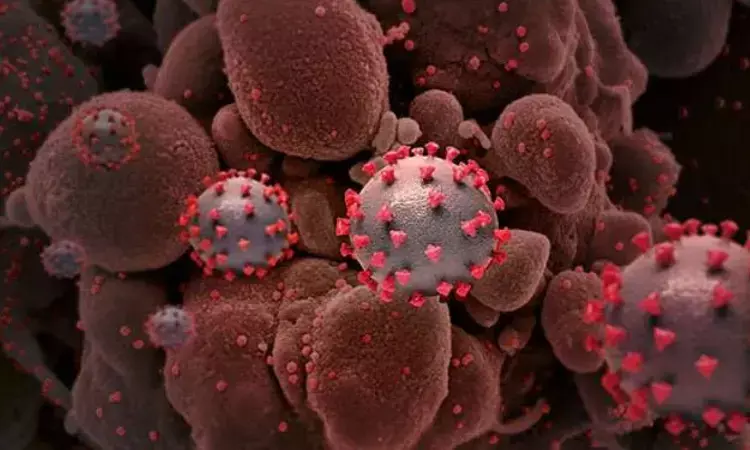- Home
- Medical news & Guidelines
- Anesthesiology
- Cardiology and CTVS
- Critical Care
- Dentistry
- Dermatology
- Diabetes and Endocrinology
- ENT
- Gastroenterology
- Medicine
- Nephrology
- Neurology
- Obstretics-Gynaecology
- Oncology
- Ophthalmology
- Orthopaedics
- Pediatrics-Neonatology
- Psychiatry
- Pulmonology
- Radiology
- Surgery
- Urology
- Laboratory Medicine
- Diet
- Nursing
- Paramedical
- Physiotherapy
- Health news
- Fact Check
- Bone Health Fact Check
- Brain Health Fact Check
- Cancer Related Fact Check
- Child Care Fact Check
- Dental and oral health fact check
- Diabetes and metabolic health fact check
- Diet and Nutrition Fact Check
- Eye and ENT Care Fact Check
- Fitness fact check
- Gut health fact check
- Heart health fact check
- Kidney health fact check
- Medical education fact check
- Men's health fact check
- Respiratory fact check
- Skin and hair care fact check
- Vaccine and Immunization fact check
- Women's health fact check
- AYUSH
- State News
- Andaman and Nicobar Islands
- Andhra Pradesh
- Arunachal Pradesh
- Assam
- Bihar
- Chandigarh
- Chattisgarh
- Dadra and Nagar Haveli
- Daman and Diu
- Delhi
- Goa
- Gujarat
- Haryana
- Himachal Pradesh
- Jammu & Kashmir
- Jharkhand
- Karnataka
- Kerala
- Ladakh
- Lakshadweep
- Madhya Pradesh
- Maharashtra
- Manipur
- Meghalaya
- Mizoram
- Nagaland
- Odisha
- Puducherry
- Punjab
- Rajasthan
- Sikkim
- Tamil Nadu
- Telangana
- Tripura
- Uttar Pradesh
- Uttrakhand
- West Bengal
- Medical Education
- Industry
Maternal COVID-19 infection increases risks of preterm birth, low birth weight and stillbirth

People who contracted COVID-19 while pregnant were more likely to have poor birth outcomes including preterm birth, small for gestational age, low birth weight, and stillbirth. The poor outcomes of preterm birth and stillbirth were observed primarily with those infected with SARS-CoV-2 during the first or second trimester, whereas increased rates of small for gestational age were driven largely by third trimester infection.
An Institute for Systems Biology-led study examined the electronic health records of more than 18,000 people with SARS-CoV-2 tests during pregnancy. Researchers compared outcomes of unvaccinated people with a positive test during pregnancy – 882 in total – to those who tested negative.
"We found that SARS-CoV-2 infection indicated increased rates of preterm delivery and stillbirth, largely driven by first and second trimester infections," said Samantha Piekos, PhD, first author of the study. She added: "The single greatest predictor of gestational age at delivery is gestational age at infection, with earlier age at infection associated with earlier age at delivery."
The people in the study had mild or moderate SARS-CoV-2 infections. Severity of maternal COVID-19 infection was not correlated with gestational age at delivery. Additionally, poor birth outcomes were present even if maternal COVID-19 didn't result in severe respiratory problems during infection.
The findings were published today in the journal The Lancet Digital Health and are among the first that account for the trimester of SARS-CoV-2 infection on birth outcomes.
People in the SARS-CoV-2-positive cohort were more likely to have Hispanic ethnicity, race other than Asian or White, Medicaid insurance, lower age, higher BMI, lower education attainment, and other factors known to be associated with negative birth outcomes. To account for this and to make a true apples-to-apples comparison, researchers used a statistical matching technique that controlled for the confounding variables.
"Pregnant people are at an increased risk of adverse outcomes following SARS-CoV-2 infection, even when maternal COVID-19 is less severe, and they may benefit from increased monitoring following infection," said Jennifer Hadlock, MD, corresponding author of the paper and assistant professor at ISB. "Both maternal and fetal health are at increased risk with COVID-19. Therefore, this reinforces the importance of protecting pregnant women," she added.
The study was conducted before COVID-19 vaccines were widely available in the United States. There is an opportunity for future studies to examine whether vaccination helps to prevent negative birth outcomes in breakthrough cases.
This research project was a collaboration between ISB and Providence.
Hina Zahid Joined Medical Dialogue in 2017 with a passion to work as a Reporter. She coordinates with various national and international journals and association and covers all the stories related to Medical guidelines, Medical Journals, rare medical surgeries as well as all the updates in the medical field. Email: editorial@medicaldialogues.in. Contact no. 011-43720751
Dr Kamal Kant Kohli-MBBS, DTCD- a chest specialist with more than 30 years of practice and a flair for writing clinical articles, Dr Kamal Kant Kohli joined Medical Dialogues as a Chief Editor of Medical News. Besides writing articles, as an editor, he proofreads and verifies all the medical content published on Medical Dialogues including those coming from journals, studies,medical conferences,guidelines etc. Email: drkohli@medicaldialogues.in. Contact no. 011-43720751


